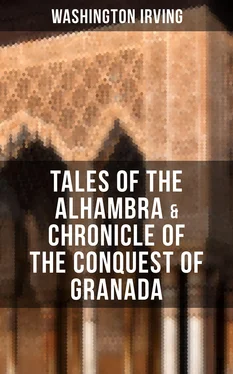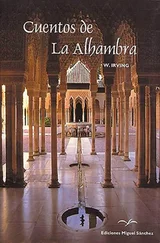“What need I of wealth,” cried the astrologer, scornfully; “have I not the book of knowledge of Solomon the wise, and through it the command of the secret treasures of the earth? The princess is mine by right; thy royal word is pledged: I claim her as my own.”
The princess looked down haughtily from her palfrey, and a light smile of scorn curled her rosy lip at this dispute between two gray-beards, for the possession of youth and beauty. The wrath of the monarch got the better of his discretion. “Base son of the desert,” cried he, “thou may’st be master of many arts, but know me for thy master, and presume not to juggle with thy king.”
“My master! my king!” echoed the astrologer. “The monarch of a molehill to claim sway over him who possesses the talismans of Solomon! Farewell, Aben Habuz; reign over thy petty kingdom, and revel in thy paradise of fools; for me, I will laugh at thee in my philosophic retirement.”
So saying he seized the bridle of the palfrey, smote the earth with his staff, and sank with the Gothic princess through the centre of the barbican. The earth closed over them, and no trace remained of the opening by which they had descended.
Aben Habuz was struck dumb for a time with astonishment. Recovering himself, he ordered a thousand workmen to dig, with pickaxe and spade, into the ground where the astrologer had disappeared. They digged and digged, but in vain; the flinty bosom of the hill resisted their implements; or if they did penetrate a little way, the earth filled in again as fast as they threw it out. Aben Habuz sought the mouth of the cavern at the foot of the hill, leading to the subterranean palace of the astrologer; but it was nowhere to be found. Where once had been an entrance, was now a solid surface of primeval rock. With the disappearance of Ibrahim Ebn Abu Ayub ceased the benefit of his talismans. The bronze horseman remained fixed, with his face turned toward the hill, and his spear pointed to the spot where the astrologer had descended, as if there still lurked the deadliest foe of Aben Habuz.
From time to time the sound of music, and the tones of a female voice, could be faintly heard from the bosom of the hill; and a peasant one day brought word to the king, that in the preceding night he had found a fissure in the rock, by which he had crept in, until he looked down into a subterranean hall, in which sat the astrologer, on a magnificent divan, slumbering and nodding to the silver lyre of the princess, which seemed to hold a magic sway over his senses.
Aben Habuz sought the fissure in the rock, but it was again closed. He renewed the attempt to unearth his rival, but all in vain. The spell of the hand and key was too potent to be counteracted by human power. As to the summit of the mountain, the site of the promised palace and garden, it remained a naked waste; either the boasted elysium was hidden from sight by enchantment, or was a mere fable of the astrologer. The world charitably supposed the latter, and some used to call the place “The King’s Folly,” while others named it “The Fool’s Paradise.”
To add to the chagrin of Aben Habuz, the neighbors whom he had defied and taunted, and cut up at his leisure while master of the talismanic horseman, finding him no longer protected by magic spell, made inroads into his territories from all sides, and the remainder of the life of the most pacific of monarchs was a tissue of turmoils.
At length Aben Habuz died, and was buried. Ages have since rolled away. The Alhambra has been built on the eventful mountain, and in some measure realizes the fabled delights of the garden of Irem. The spellbound gateway still exists entire, protected no doubt by the mystic hand and key, and now forms the Gate of Justice, the grand entrance to the fortress. Under that gateway, it is said, the old astrologer remains in his subterranean hall, nodding on his divan, lulled by the silver lyre of the princess.
The old invalid sentinels who mount guard at the gate hear the strains occasionally in the summer nights; and, yielding to their soporific power, doze quietly at their posts. Nay, so drowsy an influence pervades the place, that even those who watch by day may generally be seen nodding on the stone benches of the barbican, or sleeping under the neighboring trees, so that in fact it is the drowsiest military post in all Christendom. All this, say the ancient legends, will endure from age to age. The princess will remain captive to the astrologer; and the astrologer, bound up in magic slumber by the princess, until the last day, unless the mystic hand shall grasp the fated key, and dispel the whole charm of this enchanted mountain.
NOTE TO “THE ARABIAN ASTROLOGER”
Table of Contents
Al Makkari, in his history of the Mahommedan dynasties in Spain, cites from another Arabian writer an account of a talismanic effigy somewhat similar to the one in the foregoing legend.
In Cadiz, says he, there formerly stood a square tower upwards of one hundred cubits high, built of huge blocks of stone, fastened together with clamps of brass. On the top was the figure of a man, holding a staff in his right hand, his face turned to the Atlantic, and pointing with the forefinger of his left hand to the Straits of Gibraltar. It was said to have been set up in ancient times by the Gothic kings of Andalus, as a beacon or guide to navigators. The Moslems of Barbary and Andalus considered it a talisman which exercised a spell over the seas. Under its guidance, swarms of piratical people of a nation, called Majus, appeared on the coast in large vessels with a square sail in the bow, and another in the stern. They came every six or seven years; captured every thing they met with on the sea; guided by the statue, they passed through the Straits into the Mediterranean, landed on the coasts of Andalus, laid every thing waste with fire and sword; and sometimes carried their depredations on the opposite coasts even as far as Syria.
At length, it came to pass in the time of the civil wars, a Moslem Admiral who had taken possession of Cadiz, hearing that the statue on top of the tower was of pure gold, had it lowered to the ground and broken to pieces; when it proved to be of gilded brass. With the destruction of the idol, the spell over the sea was at an end. From that time forward, nothing more was seen of the piratical people of the ocean, excepting that two of their barks were wrecked on the coast, one at Marsu-l-Majus (the port of the Majus), the other close to the promontory of Al-Aghan.
The maritime invaders mentioned by Al Makkari must have been the Northmen.
Table of Contents
The peculiar charm of this dreamy old palace is its power of calling up vague reveries and picturings of the past, and thus clothing naked realities with the illusions of the memory and the imagination. As I delight to walk in these “vain shadows,” I am prone to seek those parts of the Alhambra which are most favorable to this phantasmagoria of the mind; and none are more so than the Court of Lions, and its surrounding halls. Here the hand of time has fallen the lightest, and the traces of Moorish elegance and splendor exist in almost their original brilliancy. Earthquakes have shaken the foundations of this pile, and rent its rudest towers; yet see! not one of those slender columns has been displaced, not an arch of that light and fragile colonnade given way, and all the fairy fretwork of these domes, apparently as unsubstantial as the crystal fabrics of a morning’s frost, exist after the lapse of centuries, almost as fresh as if from the hand of the Moslem artist. I write in the midst of these mementos of the past, in the fresh hour of early morning, in the fated Hall of the Abencerrages. The blood-stained fountain, the legendary monument of their massacre, is before me; the lofty jet almost casts its dew upon my paper. How difficult to reconcile the ancient tale of violence and blood with the gentle and peaceful scene around! Everything here appears calculated to inspire kind and happy feelings, for everything is delicate and beautiful. The very light falls tenderly from above, through the lantern of a dome tinted and wrought as if by fairy hands. Through the ample and fretted arch of the portal I behold the Court of Lions, with brilliant sunshine gleaming along its colonnades, and sparkling in its fountains. The lively swallow dives into the court and, rising with a surge, darts away twittering over the roofs; the busy bee toils humming among the flower beds, and painted butterflies hover from plant to plant, and flutter up and sport with each other in the sunny air. It needs but a slight exertion of the fancy to picture some pensive beauty of the harem, loitering in these secluded haunts of Oriental luxury.
Читать дальше












